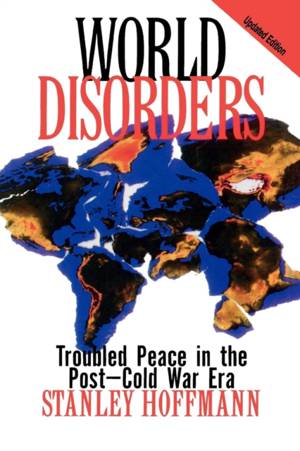
Bedankt voor het vertrouwen het afgelopen jaar! Om jou te bedanken bieden we GRATIS verzending (in België) aan op alles gedurende de hele maand januari.
- Afhalen na 1 uur in een winkel met voorraad
- In januari gratis thuislevering in België
- Ruim aanbod met 7 miljoen producten
Bedankt voor het vertrouwen het afgelopen jaar! Om jou te bedanken bieden we GRATIS verzending (in België) aan op alles gedurende de hele maand januari.
- Afhalen na 1 uur in een winkel met voorraad
- In januari gratis thuislevering in België
- Ruim aanbod met 7 miljoen producten
Zoeken
€ 74,95
+ 149 punten
Omschrijving
Stanley Hoffmann has remarked that 'It wasn't I who chose to study world politics. World politics forced themselves upon me.' Long one of the field's most distinguished thinkers, Hoffmann brings together in this volume his recent work on international politics. These essays offer incisive reflections upon the reemergence of nationalism and ethnic conflicts in Europe, the redefined role of military intervention, and other uncertainties brought on by the demise of the Cold War. Hoffmann weighs the influence of such disparate figures as John Rawls, Hedley Bull, and George Schultz. Woven throughout are his clear-eyed assessments of contending approaches to the study of international relations.
Specificaties
Betrokkenen
- Auteur(s):
- Uitgeverij:
Inhoud
- Aantal bladzijden:
- 296
- Taal:
- Engels
Eigenschappen
- Productcode (EAN):
- 9780847685752
- Verschijningsdatum:
- 22/03/2000
- Uitvoering:
- Paperback
- Formaat:
- Trade paperback (VS)
- Afmetingen:
- 151 mm x 229 mm
- Gewicht:
- 385 g

Alleen bij Standaard Boekhandel
+ 149 punten op je klantenkaart van Standaard Boekhandel
Beoordelingen
We publiceren alleen reviews die voldoen aan de voorwaarden voor reviews. Bekijk onze voorwaarden voor reviews.









